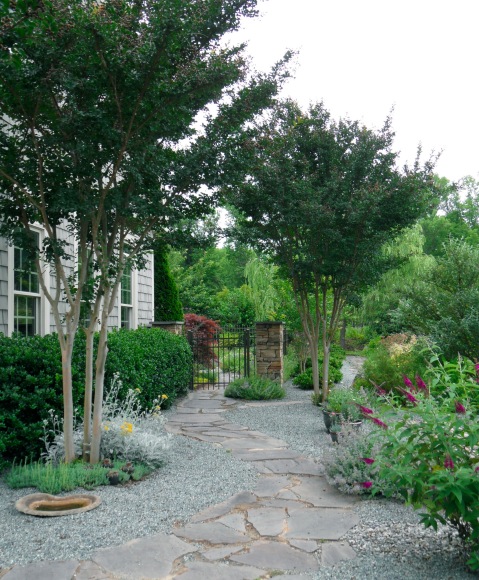 |
| The hollies in the foreground will mature to create a hedge behind the bench. May 2012. |
Je ne regrette rien. I regret nothing. The conversion of several hardwood mulched garden beds and gravel parking space to one large gravel garden is working. Over one year later and I'm a very happy gardener. The history of the gravel garden can be viewed with this link.
Gravel gardens aren't for everyone. We don't live in the southwest or west coast where gravel is widely used. This is the southeast where folks love lush lawns, flower-packed or woodland gardens.
We live on a large rural property of over four acres with two acres of meadow grass out front while the back half is in woods. We have a sufficient proportion of soft grass, forest and gardens to balance the portion of gravel used.
Our house is English-inspired, but adapted for our climate. The same is true for the gravel garden. The inspiration comes from England, but it must work here in the southeastern United States. When using gravel, I had to use something locally quarried to be affordable. No expensive pea gravel here. Our house is gray cedar shakes. Our gravel is gray.
 |
| Looking through container lavender to a low hedge or rosemary. Purple Japanese iris grow from the gravel in the dry stream. Buddleia hedge in the gravel garden along the meadow edge. May 2012. |
 |
| Rosemary, Japanese iris, Buddleia are all thriving with gravel instead of hardwood mulch. May 2012. |
 |
| The gravel entry garden is easy to keep tidy and weed-free. View is looking away from the house to the driveway. May 2012. |
So far, I've not watered the shrubs, herbs or perennials that are planted in the gravel. The exception was to get the rosemary and hollies for the hedge established with one or two waterings around the time of planting. The buddleia, crepe myrtles, existing hollies, nepeta, salvia greggii and Japanese irises were already mature and have not been watered at all since we added the gravel in April 2011.
To keep the gravel from looking stark in some spots, I'm gradually adding containers of plants that are drought-tolerant. The salvia jamensis hybrid (large container) and lavenders (various containers), junipers and succulents are doing great.
We've been getting regular rainfall so far this year, so I've not had to water the containers. Even without rain, I've selected plants that don't need to be watered often and I'm enjoying the low-maintenance. All plants used in the gravel garden, whether planted in containers or in the ground, are deer resistant.
Perhaps one of the best rewards from changing to this gravel garden is that so much of my time has been freed up to focus on the deer resistant meadow garden and the cottage garden. (We also changed the mulched flagstone paths to gravel/flagstone paths along the deer resistant meadow garden in March 2012.)
Due to this gravel garden and path conversion, I've not been working in the garden full-time. This redesign has considerably downsized the work that I was doing when I tried to grow more plants in many beds along the driveway, parking area and sidewalk—not to mention all the weeding that I had to do in the mulched paths along the deer resistant garden!
Gardening has been much for fun for me in 2012. Je ne regrette rien.
 |
| Along the dry stream, a clump of existing monarda will soon bloom. The salvia greggii is also quite happy to mulched with gravel. May 2012. |
| Words and photos by Freda Cameron, Defining Your Home, Garden and Travel. Deer and rabbit resistance varies based upon the animal population and availability of food. All company or product or patented names mentioned are registered trademarks, copyrights, or patents owned by those respective companies or persons. |












0 comments:
Post a Comment